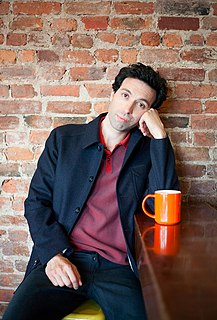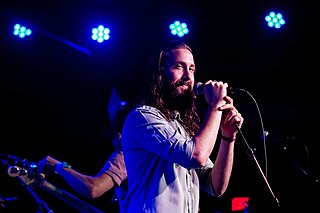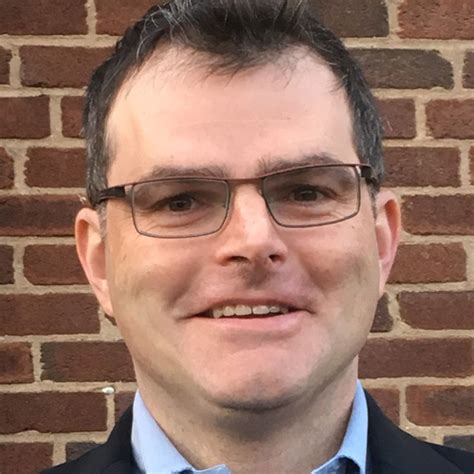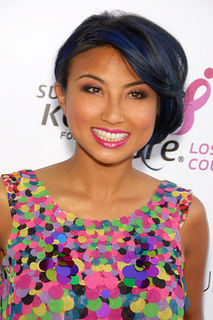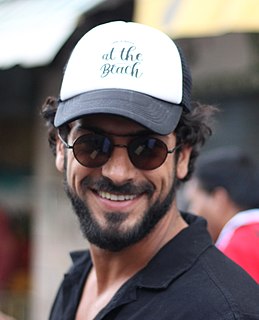A Quote by Alex Karpovsky
I do have commitment phobia, which I think is underlied by death anxiety. I feel that if you are in a relationship, there is a real genuine possibility of plateauing, and there is a possibility for a creative, emotional and spiritual death because of it. Only part of me feels this way, but it's enough to create an anxiety which makes me think twice before committing.
Related Quotes
Anxiety and desire are two, often conflicting, orientations to the unknown. Both are tilted toward the future. Desire implies a willingness, or a need, to engage this unknown, while anxiety suggests a fear of it. Desire takes one out of oneself, into the possibility or relationship, but it also takes one deeper into oneself. Anxiety turns one back on oneself, but only onto the self that is already known.
Deep within every human being there still lives the anxiety over the possibility of being alone in the world, forgotten by God, overlooked among the millions and millions in this enormous household. One keeps this anxiety at a distance by looking at the many round about who are related to him as kin and friends, but the anxiety is still there, nevertheless, and one hardly dares think of how he would feel if all this were taken away.
I think that the exactitude of the photograph has a sort of compelling nature based in its power to duplicate life. But to me the real power of photography is based in death: the fact that somehow it can enliven that which is not there in a kind of stultifying frightened way, because it seems to me that part of one's life is made up of a constant confrontation with one's own death.
I tried to think about these two issues very freely. With sex, I think I can manage with that. With death, this is a more difficult theme for me. I'm not a believer, even though I'm baptized. I don't practice. I don't believe in God, so I feel very alone facing death. What I discovered is that the only way to recognize death is if you are part of life, if you are part of sexual pleasure, if you link it with sexual pleasure.
Meditation did not relieve me of my anxiety so much as flesh it out. It took my anxious response to the world, about which I felt a lot of confusion and shame, and let me understand it more completely. Perhaps the best way to phrase it is to say that meditation showed me that the other side of anxiety is desire. They exist in relationship to each other, not independently.
In the end, I feel that one has to have a bit of neurosis to go on being an artist. A balanced human seldom produces art. It's that imbalance which impels us. I often think that all I want to do now is to avoid suicide, accidental or otherwise. Other than that, I think living on the edge is what drives my work and me beyond a certain point. The artist lives with anxiety. When you finally reach a plateau of achievement, there comes a new anxiety - the hunger to push on still further. That angst is what makes you go forward.
Our lives are about development, mutation and the possibility of change; that is almost a definition of what life is: change... If you disable change, if you effectively stop time, if you prevent the possibility of the alteration of an individual's circumstances — and that must include at least the possibility that they alter for the worse — then you don't have life after death; you just have death.
Now that I think about it, my 40th birthday was the most anxiety I've ever had, and my wedding was also the second time I've had that much anxiety. So I'm starting to realize that I can't be throwing these big bash parties because I need to own that I get anxiety with a lot of people diverting their attention to me.
I don't think anything surprised me. It was very hard for me, this story, The Snack, as a father. I have family in the army in Israel, I know families that lose their children, and I think this is the most hard thing, is faith. Because what happens after death is always belief, it's always something that you don't have any answers about, and I think the movie helps you to understand that death is part of the life. It makes it more natural.
Rational anxiety is when you're aware of the source of your anxiety. Like, if I have to host an award show or talk to millions of people on the radio, I'm going to feel anxious, and I know why. Irrational anxiety is when I'm leaving CVS, and there's a car behind me, and I'm wondering if he's following me home.
